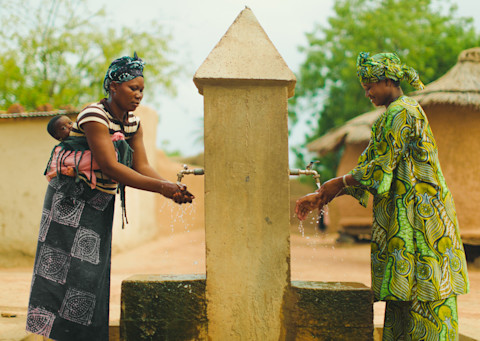Wash your hands.
It’s been the anthem of the coronavirus pandemic. But without access to clean and safe water, effective handwashing is nearly impossible.
Which means good health is nearly impossible.
Which means individuals, families, and entire communities are at unprecedented risk.
Our mission—to bring clean and safe water to people in need—is more important and more relevant than ever before.
At a time when we’re all being instructed to wash our hands to stop the spread of COVID-19, 40% of the world’s population lacks access to a basic handwashing facility. It’s even worse in Sub-Saharan Africa, where 75% of people lack access.
Since 2006, charity: water has been focused on supporting the exact areas of need we’re seeing right now. In addition to bringing clean water to more than 10 million people, our implementing partners also provide extensive water, sanitation, and hygiene (WASH) programming. That means the communities, schools, and health clinics we serve not only have access to clean and safe water, they also have the knowledge and resources they need to stay healthy.
Our response to COVID-19
The safety of our staff, partners, and beneficiaries is our top priority. Our teams in NYC and the UK have been working remotely since March 6th and will continue to do so for the foreseeable future. We’ve suspended all international travel. Our implementing partners around the world are following local guidelines for work and travel in an effort to keep everyone as safe and healthy as possible.
The coronavirus will likely impact each of our 42 country programs. The crisis continues to evolve at a rapid pace, but so far, we’re anticipating four main categories of impact:
- Access: Several of our programs have been temporarily suspended, abiding by government requirements to halt activities in communities in order to prevent the spread of COVID-19.
- Supply chain disruption: Hardware and equipment for our programs are often imported from India, China, or other regional suppliers. We anticipate delays due to disruptions in the supply chain.
- Staffing: With staff safety as a top priority, a number of our partners have shifted to a remote work model, and many report travel restrictions in their countries. This has the potential to disrupt the carefully-planned timeline for our programs as a result.
- Adaptation: With hygiene and access to safe water as the top-line defense against illness for communities worldwide, we expect several partners to adapt their program activities in order to further promote handwashing and infection control measures.
The situation is changing by the hour. We remain in close contact with each of our partners to understand how we can best support them during this uncertain time. One thing we know for sure: our work is absolutely critical. The basic preventative measures that are keeping families healthy and safe in this pandemic start with clean water and good hygiene.
The people we serve already live without much of a safety net for difficult times. Health systems are often resource-poor and can lack access to advanced resources like ICUs and ventilators. The prevalence of diseases like HIV, tuberculosis, and malaria put individuals at an increased risk. Financially, travel restrictions and local economic changes can be devastating to those whose livelihoods are already fragile. These factors make the spread of COVID-19 an especially terrifying reality for those we serve.
Now, more than ever, we need to come together to protect the most vulnerable.
So we are moving forward, with optimism and resilience. Our team is working diligently to ensure continued access to clean and safe water for more than 10 million people around the world, and we are determined to see the day when every single person on the planet has the access they deserve.
Photo by Jeremy Snell
